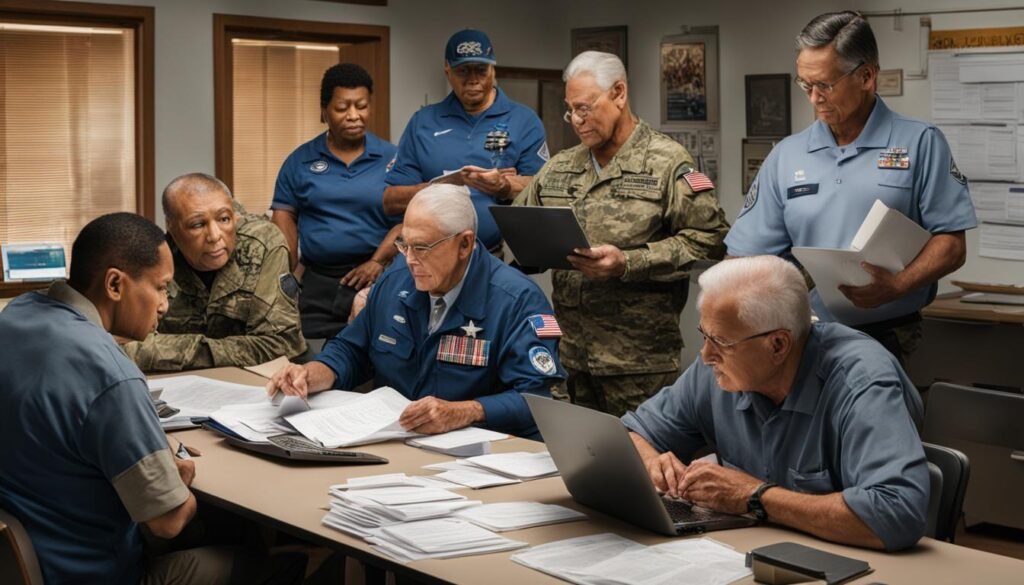Are you a veteran looking to pursue higher education? Navigating college financial aid can be overwhelming, but there are various resources available to support you in funding your college education. From veterans’ education benefits to financial assistance programs, these options can help alleviate the financial burden and make your educational goals more attainable.
Key Takeaways:
- Veterans have access to multiple financial aid options for college.
- The GI Bill is a top benefit that covers service members’ college tuition.
- FAFSA is an important part of the financial aid process for veterans.
- Tuition assistance programs provide funding for active-duty military members.
- The VA offers education benefits such as the Post-9/11 GI Bill and Yellow Ribbon program.
Understanding Veteran Affairs (VA) Education Benefits

Veteran scholarships, military education benefits, veterans college grants, and other financial aid resources are available to support veterans in pursuing their higher education goals. The VA offers several education benefits specifically designed for veterans, providing them with valuable opportunities to further their education.
One of the most well-known benefits is the Post-9/11 GI Bill, which offers comprehensive coverage of college tuition and fees for service members who served at least 90 days of active duty after September 10, 2001. This benefit extends up to 36 months, and in addition to covering tuition, it provides monthly housing payments and book stipends to help alleviate the financial burden of pursuing a degree.
The Yellow Ribbon program is another valuable resource for veterans. This program provides financial support to students attending schools with tuition and fees that exceed the maximum GI Bill benefit. By partnering with participating institutions, the VA helps bridge the gap between the GI Bill coverage and the actual cost of education, ensuring veterans can access quality education without incurring excessive financial strain.
“I am grateful for the VA education benefits that have allowed me to pursue my dream of earning a college degree. The Post-9/11 GI Bill has covered all of my tuition expenses, and the additional monthly housing payments have made it possible for me to focus on my studies without worrying about financial stress.” – Veteran testimonial
Table: Overview of VA Education Benefits
| Education Benefit | Description |
|---|---|
| Post-9/11 GI Bill | Covers college tuition and fees for up to 36 months, with additional benefits such as monthly housing payments and book stipends. |
| Yellow Ribbon program | Provides financial support to students attending schools with tuition and fees that exceed the maximum GI Bill benefit. |
| Montgomery GI Bill | Offers two types of programs: active duty and selected reserve, providing up to 36 months of benefits directly to the student. |
| Veterans’ Educational Assistance Program (VEAP) | Available for service members who served between 1977 and 1985, offering military student savings. |
| Survivors’ and Dependents’ Education Assistance (DEA) Program | Provides monthly payments for children and spouses of military service members who died, were captured, or are disabled due to a service-connected injury or illness. |
Veterans should explore these education benefits and determine which ones they are eligible for based on their service history and individual circumstances. These resources can significantly reduce the financial burden of pursuing a college degree and open doors to new opportunities for veterans in their civilian lives.
Military Tuition Assistance (TA) Programs

If you’re an active-duty military member looking to pursue higher education, you have access to tuition assistance programs offered by each branch of the armed forces. These programs provide funding for college education and can help ease the financial burden of tuition expenses. However, it’s essential to understand the specific requirements and application processes for each branch’s tuition assistance program.
Each branch of the armed forces, including the Army, Navy, Marines, Coast Guard, and Air Force, has its own unique program. While the overall goal is the same – to support active-duty military members in their educational pursuits – the application process and funding limits may vary.
It’s crucial to apply early and seek approval from the Education Center before enrolling in college. The process may involve submitting documentation, such as your military service history, course registration details, and any other required information. By following the proper procedures and meeting all requirements, you can maximize your chances of receiving the tuition assistance you need.
To ensure you’re well-informed and prepared, consult the specific guidelines and resources provided by your branch of the armed forces. They will outline the eligibility criteria, funding limits, and steps you need to take to apply for tuition assistance. By taking advantage of these programs, you can pursue your educational goals while serving in the military.
Comparison of Tuition Assistance Programs by Branch
| Branch | Program Name | Tuition Coverage | Funding Limits |
|---|---|---|---|
| Army | GoArmyEd | Up to 100% | Limit per fiscal year |
| Navy | Navy College Program | Up to 100% | Limit per semester |
| Marines | Marine Corps Tuition Assistance | Up to 100% | Limit per fiscal year |
| Coast Guard | Tuition Assistance Program | Up to 100% | Limit per fiscal year |
| Air Force | Air Force Tuition Assistance | Up to 100% | Limit per fiscal year |
How Can Veterans Maximize Their Education Benefits and Financial Aid for College?
Veterans should leverage their veteran education benefits and financial aid to maximize their college experience. Utilize resources like the GI Bill and tuition assistance programs to cover tuition and expenses. Explore scholarships and grants specifically for veterans to further reduce the financial burden of higher education.
Conclusion
Veterans have a range of financial aid options available to them when it comes to funding their college education. Whether it’s through the GI Bill, FAFSA, tuition assistance programs, or federal student aid, veterans have resources to support their educational goals.
The GI Bill is one of the most valuable benefits offered by the military, covering tuition costs for service members. Additionally, veterans can also benefit from the Free Application for Federal Student Aid (FAFSA), which opens up opportunities for grants, loans, and work-study programs.
For veterans seeking additional financial support, there are specialized programs like the Yellow Ribbon program, which provides assistance for tuition and fees that exceed the GI Bill benefits. The Montgomery GI Bill is another option that offers education benefits directly to the student, with different programs available for active duty and selected reserve veterans.
Each branch of the armed forces also offers its own tuition assistance program for active-duty military members, further expanding the financial aid options available to veterans. It’s crucial for veterans to explore and take advantage of these opportunities, ensuring they make the most of their educational benefits.



